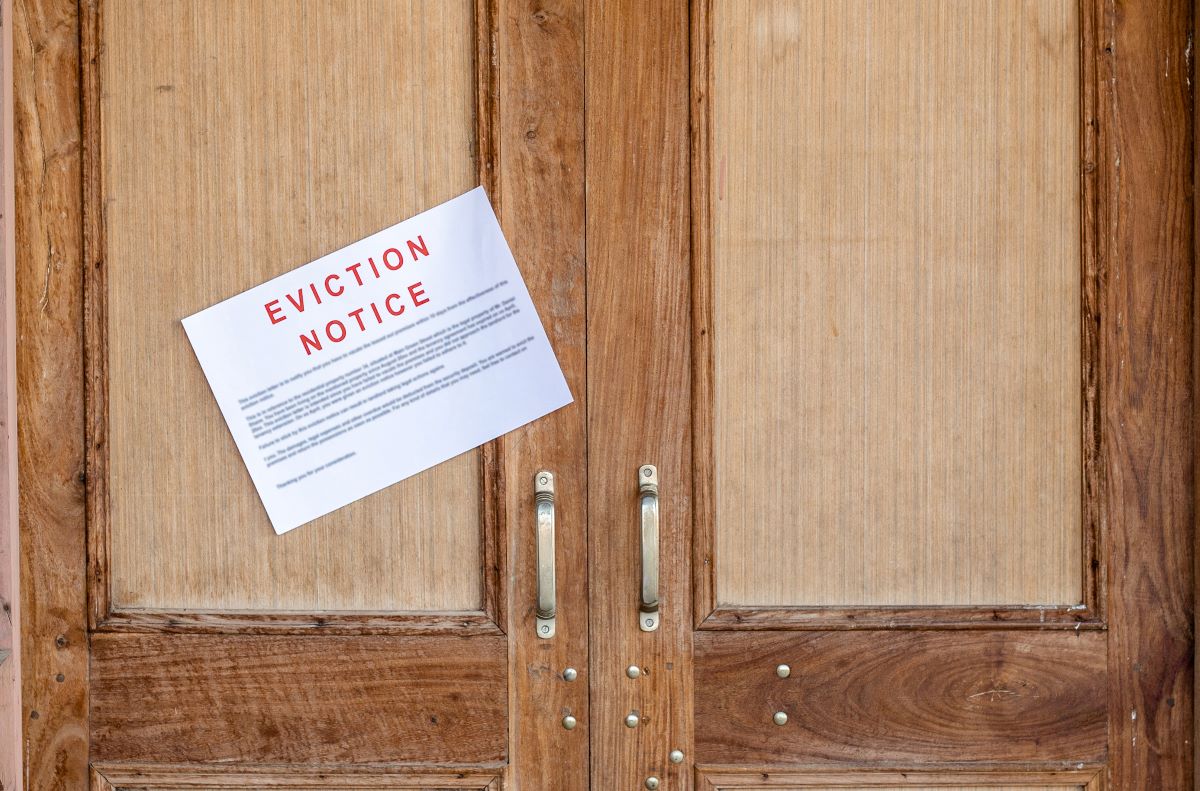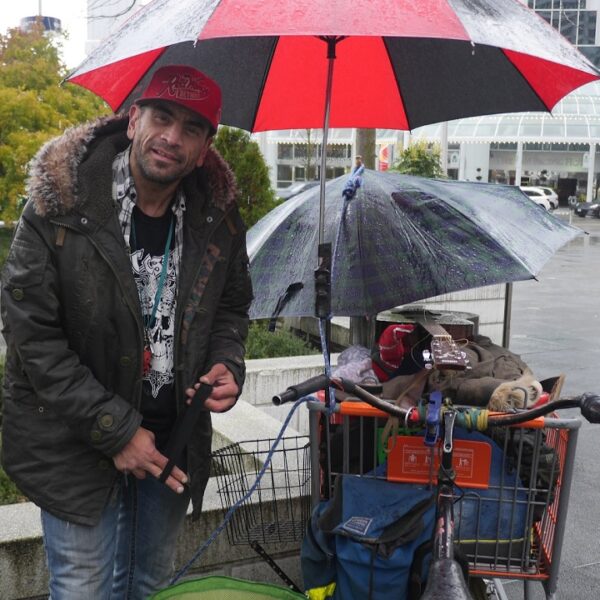Evictions are violent.
That’s a statement you read a lot when you follow Invisible People, and it is true. So much of our work is about housing people who are currently homeless. But it is just as important to prevent more people from becoming homeless.
And what many people don’t realize is how many housed people are in danger of becoming homeless:
You’re not only closer to homelessness than being a billionaire. You’re closer to homelessness than to buying any home in many major cities. You’re closer to homelessness than being able to ever actually retire. When you see it that way, the crisis is impossible to ignore.
— Dana White (@ItsDanaWhite) January 26, 2023
Recently, tenants’ rights attorney at Mobilization for Justice Leah Goodridge broke down the eviction process in a Twitter thread, giving us a closer look at this important area of the fight against homelessness.

Tenants’ Rights Attorney Leah Goodridge Photo credit: Laura Merrill
Invisible People had the opportunity to interview Goodridge so that she could elaborate on what she stated in her thread. Here is our conversation with her:
An Interview with Tenant Rights’ Attorney Leah Goodridge
Invisible People: Are all evictions unjust?
Leah Goodridge: “I think when anyone hears about eviction, one of the main things people respond with, or at least naysayers respond with, is ‘Just pay your rent.’ And my response to that is, what if the rent is too high for most people to pay regardless of how much they make? And in New York City and a lot of other cities, that’s the case.”
“So I think a lot of these evictions are unjust. And it’s more about a larger system that produces this dynamic where you have rent that’s $4,000 sometimes for a one-bedroom and people who are making $50,000, which is the average salary in that city. It’s just not sustainable. So I would say that evictions are unjust, and they’re also violent.”
IP: How can landlords be more flexible with tenants struggling to pay their rent on time?
LG: “A lot of landlords are very aware of Section 8 vouchers and the way that that system works. And so for this, for when someone owes rent, I think it’s also helpful for them to be aware of rental assistance programs to be able to share information with their tenants, to say, ‘Go and apply here right away.'”
IP: You said tenants’ first reaction to eviction is shock. Is there also denial?
LG: “I would call it less a denial and more processing that it’s happening. I think the main reaction, initially, that I have observed from tenants over the years is framing an eviction case as just a misunderstanding or something that the landlord and them can work out. When in actuality, once a landlord has spent money and they’ve paid a lawyer to bring a case, it’s something that is going to be worked out in court; it’s not going to be worked out outside of court. So the main reaction is just processing that this is even happening.”
IP: You said you need to get the tenants in the right headspace to fight back. How do you go about doing that?
LG: “I tell them that the landlord will follow the legal procedures, and if you approach it as a sort of informal process, then you’re more likely to be evicted. I tell them from my experience of working with tenants over the years what I’ve seen and basically what the trends are and what tends to happen, and that provides more insight for them to make a better decision as to how to move forward.”
IP: You mentioned that there are often issues that the tenants let go, and then bring up when they’re facing eviction, like repairs that haven’t been made. Can you use those issues to argue their case against eviction?
LG: “Yes. Those are defenses. Oftentimes, for example, if someone owes rent, but at the same time they have repairs, a tenants’ attorney in New York will try to seek what’s called an abatement. If they’re saying, for example, you owe $5,000, we’ll try to get off a month or two month’s rent because of the repairs. And it depends on how bad the repairs are.”
IP: How does the process play out when tenants can’t get an attorney and must navigate an eviction case independently?
LG: “It’s hard. It means that they are more likely to get evicted. (In New York) there’s a program called The Right to Counsel, and, as part of The Right to Counsel, the city funds local legal services nonprofits, and we provide these free legal services to tenants. And basically, we’re all at capacity and sort of at a standstill with the city about funding us more. So we are seeing this play out right now.”
“There are a lot of tenants that we have to tell, ‘We’re unable to represent you at this time because we’re at capacity.’ So before The Right to Counsel, the reason why it even became law was because tenants would go to court. People are really nervous in court, and they’d sign agreements right away that were unfair to them, unbeknownst to them. They’d sign agreements, for example, saying, ‘I’m gonna move out,’ when they didn’t necessarily have to do that. They might have legal defenses they didn’t even know they could raise. So it is really hard, it’s very difficult to go at it alone.”
IP: You mentioned it’s important to build trust with tenants because many of them have been through the dehumanizing experience of going to city agencies asking for rental assistance. How do you go about building that trust?
LG: “I listen. By the time the tenant comes to see me, they have been trying to tell their story to various people, whether it be the judge or someone in a city government office. And all these places are packed, so there isn’t time for them to listen to the stories. They are very numbers based: ‘What is your index number … Where is your lease.'”
“So when the tenants come to me, and they start to tell their story about what’s been going on, I am quiet, and I listen. And that lets the tenant know they can trust me because I’m here to listen to their story. And then, when they’re done with their story, I let them know what I’ve seen. But just even the process of letting a tenant speak and hearing their voice is the main way that I build trust.”
IP: You said that there is trauma involved with facing eviction before even becoming homeless. Just the stress of thinking about becoming homeless can cause trauma. Can you elaborate on that for people who may not take that type of trauma seriously?
LG: “I was actually initially motivated to write the Twitter thread about what it’s like facing eviction because I had posted about a trans woman in Seattle who died during the eviction process. It looks like she may have unalived herself, but that wasn’t clear. But the point is, it was so violent and stressful that someone died.”
“And the responses to that were sort of like, ‘Oh, well, just pay your rent’ or ‘Just go to the homeless shelter.’ And I don’t think that people understand that a lot of these homeless shelters are actually very dangerous, and they’re more dangerous depending on the identity of the person. If you’re a trans woman, homeless shelters are dangerous. They’re very dangerous. Depending on the state that you live in, they may not even abide by the gender that you are identifying with.”
“There have been many lawsuits in New York historically; there are a lot of sexual assaults that happen. Essentially, it is a space where the most vulnerable people are, and their voices are not heard. And so, unfortunately, that also means that it becomes a place where predators lurk.”
IP: How do you go about combating the narrative that rent control is a bad thing?
LG: “I show examples of what happens when there isn’t rent control. Boston is a prime example; they’re fighting to have rent control right now. Boston has become incredibly expensive. In Lawrence, Massachusetts, there are tenants fighting because their rent went up 50%. That’s unconscionable, especially at this time.”
“I think that there are still people who deny the fact that the pandemic has had an economic impact. There are people who deny the fact that the pandemic is even a pandemic. As part of that, there are a lot of people who don’t understand that many people lost their jobs. And even if they may have found a job at this point, they’re still economically digging themselves out from that period of however long they didn’t have income.”
“So rent increases right now under the thinking that ‘I as a landlord have to make up for the fact that during the pandemic there was an eviction moratorium,’ is just unconscionable.”
To read more about the need for rent control, click here.













